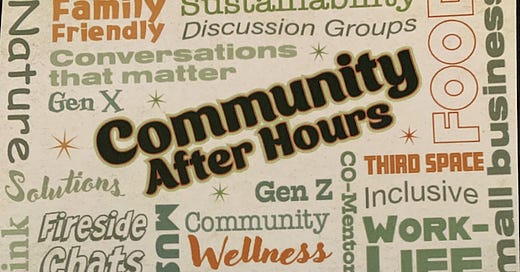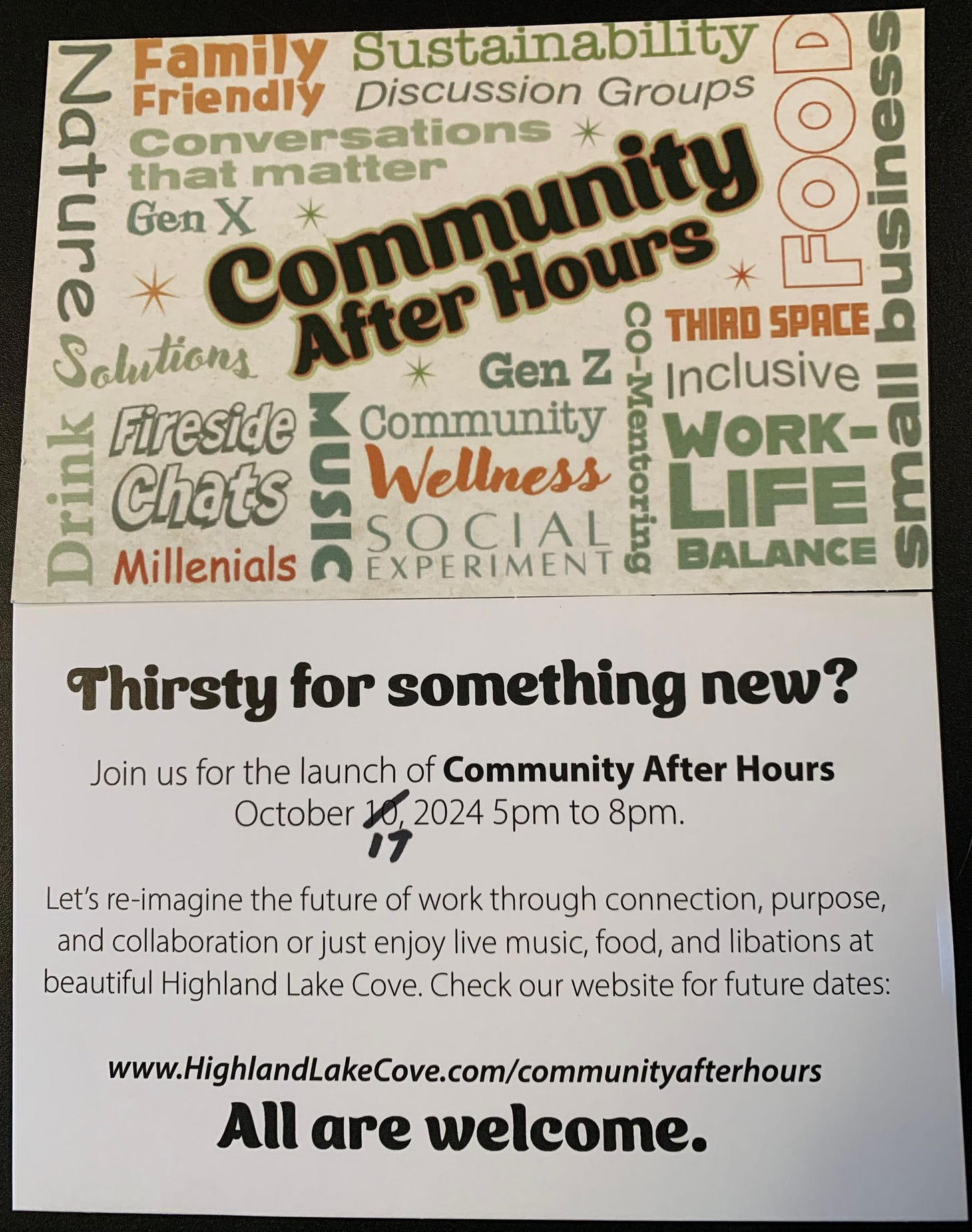As I write this, it’s Thursday, October 10, exactly two weeks since Hurricane Helene slammed into the western part of my home state of North Carolina. As I sit outside my local Ingles, enjoying a bright, brisk afternoon, it almost feels like any other day. People stroll in and out of the store, chatting, running errands, as though nothing out of the ordinary had happened just 14 days ago. My dog, Rascal, is by my side, and I’m using the store’s wifi—still waiting for the internet in my home office to come back.
But two weeks ago, a store of the same brand was anything but peaceful. In the wake of Helene, the scene inside the Candler Ingles was straight out of a dystopian movie. My daughter, Amber, and I, along with my two grandkids, three-year-old Logan and one-year-old Piper, had ventured out in search of basic supplies—food, water, gasoline, anything we could find. The parking lot was packed to overflowing, and inside, it was a crush of people, all grappling with the same overwhelming need. The store’s systems were down—no credit cards, only cash, and only a few working registers. Yet despite the strain, there was a surprising sense of calm, a kind of quiet determination as people lined up, waited for hours, and helped one another through the chaos.
We spent over three hours in line that day, clutching what little we could find, surrounded by faces that, like ours, were tired, anxious, and uncertain. In moments like these, it becomes clear that while hurricanes like Helene devastate communities, they also reveal something essential: the strength we find in each other when systems we have counted on and taken for granted fail.
Now, two weeks later, the immediate crisis has passed in my area of Hendersonville/Flat Rock though it’s still tenuous in Asheville and Candler where my daughter live. The roads are mostly cleared, the power is back on, and people have begun to return to their routines. But sitting here, I can’t shake the feeling that we’re living in the calm between storms—not just weather storms, but the larger, looming crisis of climate change that threatens to bring more disasters like Helene, more frequently and with greater intensity.
I’m skeptical that our political system is equipped to solve this crisis—actually more than skeptical, I’m resigned that indeed our political system itself needs a major revamping/redesign. We’ve seen too many promises unkept, too much gridlock, two parties more bent on making each other wrong than actually serving “we the people.” But if there’s one thing those five days without power, limited water, and no communication taught me, it’s that we can’t wait for someone else to come to the rescue. It’s in our local communities, in the everyday connections we have with one another, that we find real strength. The chaos inside Ingles wasn’t just about survival—it was about people quietly pulling together in the face of something bigger than themselves.
As I reflect on this, I realize that the solutions we need to face climate change may not come from the top down, but from the bottom up. It starts with us—here, in our communities. It starts with how we respond, how we rebuild, and how we come together to create something more resilient for the future.
Facing Reality and Moving Forward Together
The night Hurricane Helene hit, my daughter Amber called me in a panic—water was seeping through the walls into her basement, and it wasn’t slowing down. I packed a bag, headed over to her house, and we spent the next several hours in an exhausting effort to keep the water at bay. With a wet vac and sheer determination, we took shifts vacuuming up the water, trying to stay ahead of it as the storm raged outside. The walls of her basement felt like they were crying out from the pressure of the rising water, and as the hours passed, the task began to feel hopeless…and yet we persisted.
By 3 a.m., the power finally gave out. The vacuum stopped, the lights went dark, and we stood there in the silence, exhausted and facing the reality of our situation. We had done all we could, but without power, we were out of options. It was a humbling moment—standing in that flooded basement with the water gathering around our feet, realizing that no matter how hard we worked, there were forces beyond our control.
But as overwhelming as it was, it didn’t feel like defeat. In fact, it was in that moment of surrender that we found clarity. We couldn’t stop the water without power, but we could still make a plan. We talked about what we could salvage, how we would clean up, and what steps we’d need to take once the power returned. What started as a desperate attempt to control the uncontrollable turned into a lesson in adaptation, in facing the constraints of reality without giving up.
That’s what resilience looks like—not the absence of struggle, but the willingness to face it head-on and adapt. Amber and I couldn’t stop the storm, but we could prepare for what came next. We could move forward, even if it meant letting go of what we couldn’t save.
In many ways, this experience mirrors what we need to do on a larger scale in response to the climate crisis. We can’t control the storms, but we can control how we prepare, how we come together to support one another, and how we rebuild in their aftermath. Just as Amber and I found strength in each other that night and the following days, our communities can find strength by working together—not just in moments of crisis, but in the long, slow work of building something more sustainable.
The reality we face is daunting. Climate change is here, and it’s not going away. But just as we found a way to keep moving forward after Helene, we can find ways to move forward as communities, creating systems that are more resilient, more adaptable, and more capable of withstanding the challenges ahead. It starts with acknowledging the reality of our situation and working together to find solutions—solutions that aren’t dependent on the whims of politicians, but on the strength of local communities.
Next Steps: Building Resilient and Regenerative Communities
The storms are becoming more frequent, more intense. Climate scientists have linked Hurricane Helene’s devastation directly to human-caused climate change. Research shows that warmer sea surface temperatures fueled the storm, increasing its rainfall by about 10% and intensifying its winds by 11% (Climate Fact Checks). Helene’s rapid intensification and the catastrophic inland flooding it caused are now more common as a result of global warming. Experts warn that storms like this, and Hurricane Milton currently hitting Florida, will only become more frequent as temperatures continue to rise.
These storms aren’t isolated events—they’re part of a larger, climate-driven pattern that we can no longer ignore. But we don’t have to be powerless. While we can’t prevent the next hurricane, we can build resilience into our communities to withstand the challenges ahead. And beyond just adaptation, we must turn our focus to reversing the damage of climate change. This means thinking both locally and globally—taking immediate action while contributing to broader, long-term solutions.
We can start by regenerating local ecosystems. This could mean reforestation, restoring wetlands, or turning underused spaces into community gardens—all actions that help absorb carbon and restore biodiversity. It’s about building resilience from the ground up while actively working to heal the planet.
Reducing community carbon footprints is another critical step. This includes shifting to renewable energy sources, encouraging energy-efficient practices, and supporting local policies that drive sustainable development. Small-scale solar or wind projects can reduce dependence on fossil fuels and can be initiated within neighborhoods. Communities can also implement local composting and recycling initiatives to reduce waste, ultimately lessening the burden on larger infrastructures.
While acting locally, we can also amplify our impact globally. Joining international climate initiatives or advocating for stronger policies can send a powerful message. Support for global reforestation projects or carbon offset programs allows communities to engage in reversing climate change beyond their immediate borders.
It’s time to think beyond just surviving the next storm and start creating systems that can weather not just the physical storms, but the social and economic ones as well—and actively contribute to reversing the forces that created them. And that means taking action now—before the next crisis hits.
Whether it’s creating local food systems, setting up renewable energy projects, regenerating ecosystems, or advocating for global climate solutions, we have the power to create change. We don’t need to wait for someone to come save us. The strength we need is already here, in our communities, in the relationships we build, and in the actions we take.
One way my wife and I are stepping into this work is through a local initiative called Community After Hours. This weekly gathering brings together individuals of all generations—Millennials, Gen X, and Gen Z, and yes us Baby Boomers as well—to reimagine the future of work, community, and sustainability. Starting on October 17, we’ll meet every week at Highland Lake Cove in Flat Rock, NC, for open discussions, live music, food, and a chance to explore collaborative solutions to the challenges we face.
We believe these gatherings can spark meaningful change—by creating a space for conversations that matter and co-mentoring across generations, we can find local solutions to global problems like climate change. Whether it’s planning for local food systems or discussing sustainable business practices, our goal is to foster resilience and creativity in a time of uncertainty.
If you’re in the Flat Rock or Hendersonville area, we’d love for you to join us. This is a free event designed to build connections and inspire action. For more details, visit Community After Hours. Let’s re-imagine the future together.
The Time to Act is Now
The storms are growing stronger, and the challenges we face are immense. But so is our ability to respond. What Hurricane Helene has taught me is that the power to create change doesn’t come from waiting for someone else to act—it comes from what we choose to do in our communities, today.
We can no longer afford to think small. Each of us has a role to play in reversing climate change and creating resilient, regenerative communities. Whether it's joining local efforts like Community After Hours, starting your own community initiative, or making sustainable choices in your everyday life, every action matters.
It starts with conversations. It starts with connection. It starts with us.
The future we want won’t come from the top down—it will be built from the ground up, by people like you, people like us, who are committed to acting now, in the face of uncertainty. This is our moment to step forward, to create, and to lead.
Together, we have the power to build communities that are stronger, more connected, and more capable of facing whatever comes next. The work is hard, but it’s meaningful. It’s about leaving a legacy of hope, of action, and of resilience for the generations that will follow us.
So I invite you to join us. Wherever you are, take that first step. If you’re local, come to Community After Hours—let’s reimagine the future together. And if you’re not, start where you are, connect with those around you, and begin building the change we all need.
Life is a conversation, so let’s get to creating a life where we move from surviving to thriving. Click the button below to leave a comment—I’d love to hear your thoughts.
And if this message resonated with you, please share it with others. The more of us who join this conversation, the more impact we can have.
The time to act is now. Let’s get to work.














Share this post